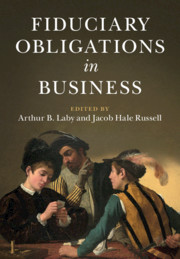Book contents
- Fiduciary Obligations in Business
- Fiduciary Obligations in Business
- Copyright page
- Dedication
- Contents
- Contributors
- Editors’ Acknowledgments
- Introduction The Decline and Rise of Fiduciary Obligations in Business
- Part I Identifying Fiduciaries and Their Duties
- 1 Fiduciary Duties on the Temporal Edges of Agency Relationships
- 2 Extra Large Partnerships
- 3 The Three Fiduciaries of Delaware Corporate Law—and Eisenberg’s Error
- 4 Trust, Discretion, and ERISA Fiduciary Status
- 5 Examining Indenture Trustee Duties
- Part II Gaps and Alternatives in Fiduciary Regimes
- Part III Historical and Comparative Perspectives
- Part IV Stakeholders and Society
- Index
1 - Fiduciary Duties on the Temporal Edges of Agency Relationships
from Part I - Identifying Fiduciaries and Their Duties
Published online by Cambridge University Press: 20 August 2021
- Fiduciary Obligations in Business
- Fiduciary Obligations in Business
- Copyright page
- Dedication
- Contents
- Contributors
- Editors’ Acknowledgments
- Introduction The Decline and Rise of Fiduciary Obligations in Business
- Part I Identifying Fiduciaries and Their Duties
- 1 Fiduciary Duties on the Temporal Edges of Agency Relationships
- 2 Extra Large Partnerships
- 3 The Three Fiduciaries of Delaware Corporate Law—and Eisenberg’s Error
- 4 Trust, Discretion, and ERISA Fiduciary Status
- 5 Examining Indenture Trustee Duties
- Part II Gaps and Alternatives in Fiduciary Regimes
- Part III Historical and Comparative Perspectives
- Part IV Stakeholders and Society
- Index
Summary
The duties that principals and agents owe each other are typically coterminous with the agency relationship itself. But sometimes temporal lines of clean demarcation do less work. The Chapter identifies situations in which an agent may owe duties—including fiduciary duties—to the principal prior to the formal start of their relationship, including any enforceable contract between the parties. Likewise, not all duties that agents and principals owe each other end with the relationship. The Chapter explores the rationales for duties at the temporal peripheries for an agency relationship and the extent to which they are derived from doctrines distinct from agency law. Issues in some contexts are amenable to resolution through bright-line determinations; others require nuanced and fact-specific inquiry.These structural consequences of agency require tempering either the claims to generality or the content of some theoretical accounts of fiduciary relationships more broadly, particularly those stressing the cognitive dimensions of agents’ loyalty and demanding robust commitment from the agent.
Keywords
- Type
- Chapter
- Information
- Fiduciary Obligations in Business , pp. 23 - 39Publisher: Cambridge University PressPrint publication year: 2021

